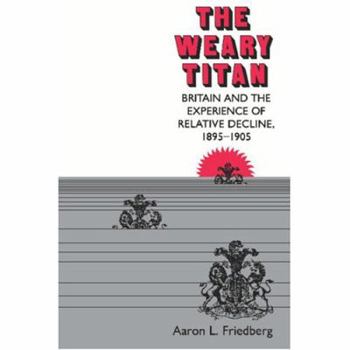The Weary Titan: Britain and the Experience of Relative Decline, 1895-1905
Select Format
Select Condition 
Book Overview
The description for this book, The Weary Titan: Britain and the Experience of Relative Decline, 1895-1905, will be forthcoming.
Format:Paperback
Language:English
ISBN:0691008442
ISBN13:9780691008448
Release Date:October 1989
Publisher:Princeton University Press
Length:352 Pages
Weight:1.10 lbs.
Dimensions:0.8" x 6.1" x 9.2"
Customer Reviews
2 ratings
How can you tell when the sky is falling?
Published by Thriftbooks.com User , 16 years ago
The argument that the United States is on the precipice of dramatic and strategically painful relative decline has come in and out of fashion many times over the past half century. The aggressive expansion of the communist bloc in the 1950s, the domestic upheaval and Vietnam War in the 1960s, Watergate and the oil shock in the 1970s, and economic competition from Japan and the Asian tigers in the 1980s all seemed to signal the twilight of American global dominance. And yet at the turn of the millennium the US stood unrivaled and beyond doubt the most powerful nation or empire ever to straddle the earth. Today, with the rise of China and to a lesser extent India, along with two financially draining and unpopular wars, the idea that America's best days are behind her is again in vogue. This learned piece by Princeton political scientist (and former national security assistant to Vice President Dick Cheney) Aaron Friedberg was written the last time the general consensus held that America was in decline - the late 1980s. Friedberg reviews four distinct dimensions of national power: economic, financial, naval, and land power. He uses the late Victorian British Empire as a case study to test three central and timeless strategic questions: 1) How do statesmen measure relative national power? 2) How do individuals and entire governments become aware of unfavorable changes in the relative power of their own countries? 3) How do nations seek to adapt to such shifts? Friedberg demonstrates that in each issue the debate ultimately revolved around a single, almost arbitrary measure of power. In the economic debate it was the import-export trade balance; for financial power it was the ability to maintain a balanced budget without raising taxes; for naval strategy it was the number of modern battleships in the fleet; and for land power it was the number of infantry reinforcements available to support India in the event of a Russian invasion via Afghanistan. Friedberg notes that the these simple measures "narrowed attention to a very small range of familiar, countable factors...[that] were imprecise and sometimes downright deceptive." As to the second question, governments often become aware of the issue after a long and passionate campaign by a leading political or military figure. The issue of British economic competitiveness and financial strength was defined by Joseph Chamberlain in his drive to create an imperial union out of the British empire with protective measures to compete with larger, more integrated economies, such as the US and Russia. It was Jackie Fisher and his naval revolution at the Admirality that raised and defined the debate in the navy. And it was Lord Roberts' call for peacetime conscription to meet the manpower requirements for the empire that called attention to Britain's weakness in landpower. And finally how do nations adapt? In an uneven and fragmented manner, Friedberg says. The chapters on economic and financial p
The Weary Titan
Published by Thriftbooks.com User , 21 years ago
For any student of history who has an interest in world events, they should read this book. I did not realize the economic and military problems Britian was having in being able to afford and defend their large empire. Frieberg describes how, at the end of the 18th century the changes in technology, was creating serious defense problems, in addition the British dislike of military conscription put the British Army at a serious disadvantage. The army's problems, evident in the Boer War became a true disaster in WWI. In the end Britian was unable and unwilling to "pay for the privilege" of being a world power.






